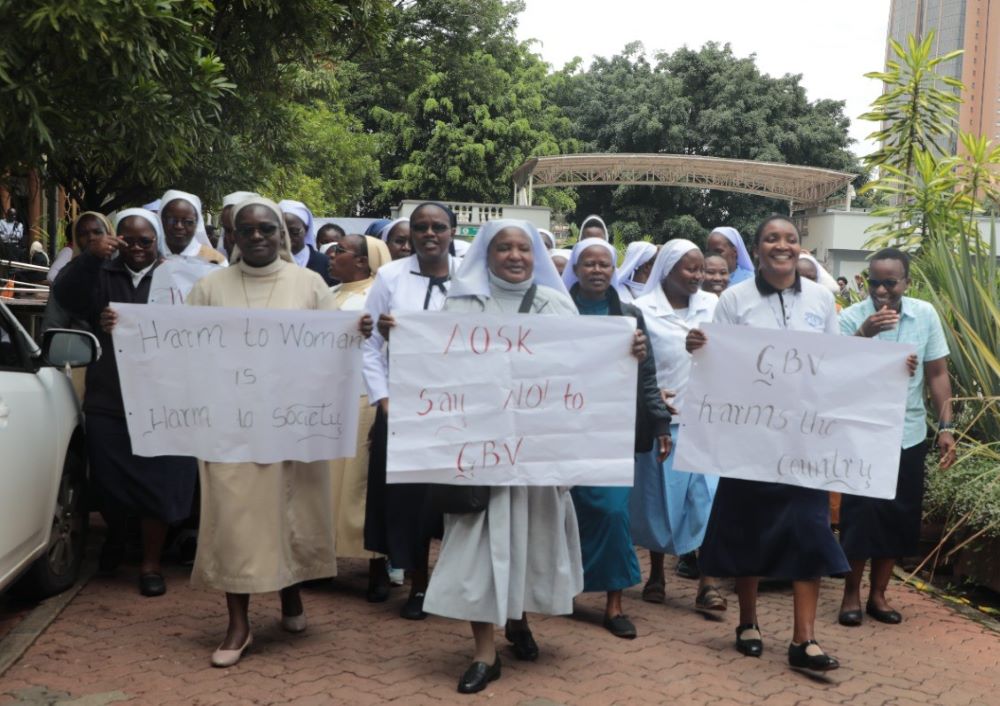
Members of the Association of Sisterhoods in Kenya from 47 counties in Kenya recently visited the Ministry of Gender and Social Services to issue a statement against gender-based violence in the country. (Victor Emoja)
Editor's note: This story contains graphic details about sexual assault.
Reflecting deeply on the topic of sexual assault makes my heart sink with pain because it rarely, if ever, is taken seriously in many African countries. The memory of my own experience of walking with a woman who had experienced it increases the pain I feel. The woman was abused by a cousin more than 40 years ago, and during all this time, she has lived a life of turmoil and fear. She was threatened to keep silent, and she became withdrawn and overwhelmed with feelings of helplessness and meaninglessness. No one felt trustworthy to her. At times, something would trigger the experience, throwing her mentally off balance. She was treated for post-traumatic stress disorder but never fully recovered. However, she continues with psychotherapy, which is helping her slowly put her life back together.
That is only one story of hundreds of women who have experienced sexual assault, unfortunately, a too common form of trauma in all countries of the world. According to UN Women, globally, almost 1 in 3 females age 15 and older have experienced physical and/or sexual intimate partner violence, non-partner sexual violence, or both at least once in their life.
In addition, 26% of females 15 and older have experienced intimate partner violence, and of those who have been in a relationship, almost 24% of adolescent girls has experienced physical and/or sexual violence from an intimate partner or husband, according to UN Women.
In Kenya, incidents increased after the 2007-2008 elections, perpetrated by men in village communities and by law enforcers and police sent to stop violence. Survivors explained how men in uniform took part in raping them and inserted guns into their private parts. Participants in armed conflicts become perpetrators, too. Though this can be contextualized by the fact that militia groups could dress in police attire and commit such crimes, some were afraid to report and identify their perpetrators for fear of incrimination.
Sexual assault is a by-product of gender inequality, culture and traditional beliefs and practices where women are seen as objects to be used or controlled. Practices include forced early marriages, often for economic reasons and girls being beaded (booked) for early marriage even at birth; female genital mutilation; and femicide. All occur in Kenya. I can say, fortunately, at this time, it is not among the countries where women are killed after being raped. Cultural practices have contributed to gender-based violence in Africa. The Association of Sisterhoods of Kenya (AOSK) has already established a gender desk and plays a role in stopping this inhumane culture and behavior.
In our African culture, sexual issues, whether positive or negative, are never talked about publicly. Some of the practices are publicly known, such as female genital mutilation or celebrations of menstruation or male initiation, where some tribes allow their young men to engage in sex, and they can even rape the newly initiated girls who are under 12. Because rape is not taken seriously, they negotiate rape in communities and accept reparation in terms of animals or money, and the male is cleansed from the bad act while the female is just left to suffer their pain silently. These girls are forbidden to say anything and may be stigmatized in the community if they share their stories. Although Kenya has laws that clearly state what procedures must be followed after an incident, these procedures do not accord true privacy that upholds the dignity of the abused. Even the language used by the court system demeans the women, reducing them to mere "cases" of rape. Women report that this language makes them feel as though they do not exist.
In addition to fear and the trauma of public court hearings, other obstacles prevent women from reporting sexual assaults. For me, as an African woman, even considering willingly standing before a court of both women and men, accusing someone of raping me is unimaginable. The idea of having all those eyes staring at me terrifies me. Shame, fear of being misunderstood, stigma and having to tell the story over and over would be traumatizing.
One of the most significant barriers has to do with family relationships. Many sexual abuses are perpetrated by family members and people well known and trusted by the family. Therefore, secrecy and avoidance of shame are often the most important and increase the fear of not being believed even if reporting abuse.
Victims also face legal barriers. Required samples to prove assault must be obtained within 24 hours, and many perpetrators, knowing this rule, tamper with evidence by forcing the women to bathe so that all evidence is destroyed. Even getting to a hospital for testing can be impossible because of limited access to transportation. Added to this is that receiving medical care can be prohibitive because of cost unless the person assaulted has national health insurance. Further, health care providers are frequently not well trained in the seriousness of such a situation and refrain from reporting the incident. When taking samples, others ignore important details, which means they cannot be used in court hearings.
Lastly, bringing an assault incident to court hearings requires lawyers whose fees are expensive and thus prohibitive for women who are poor and often the breadwinners of their families.
Even though there are gender desks in many regions of a country organized to help people assaulted, admission to the gender officer for assistance requires the person to narrate their story at the front desk in a public waiting room. These barriers often lead families to retreat to traditional solutions, which rely on negotiations between families of perpetrators and the abused. The perpetrator may be demanded to "pay damages," but the money goes to the family of the abused and does not help the victim. There does not seem to be much understanding of the impact of sexual assault on the person suffering and emotionally abandoned.
Advertisement
When such a traumatic event is not responded to by the community, the trauma becomes like the personal property of the one assaulted and begins to occupy a larger part of the individual's life. Keeping the incident private often leads to PTSD, which can persist even into later life. Women report that life becomes colorless and even when engaging in sexual activity with their husbands, they do not enjoy the experience. Sexual assault kills life and unfortunately, this damage is not felt at a similar intensity by the perpetrators so that justice can be truly served.
Sexual abusers have often been victims of abuse themselves, another fact often not realized or accepted by families or communities. As I have been involved with women who have been abused, I have become more aware of how all of us need to invest more in ridding the world of sexual assault by becoming aware of its harm not only to individuals but to society. All sectors of government, law enforcers and communities, which are primarily male-dominated, need to recognize and be willing to claim their responsibility to protect the dignity of all people. Health care providers also need specific training on how to support victims of sexual assault and protect their dignity.
Our churches and all of us together need to examine our cultural beliefs and practices that allow sexual assault and erode our Christian responsibilities to care for all people as sisters and brothers.





